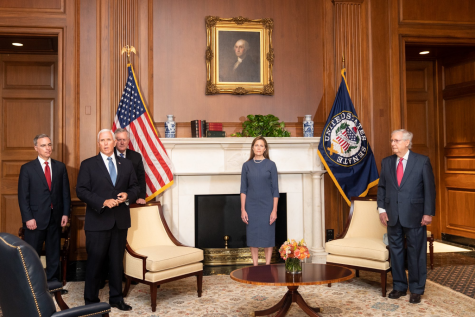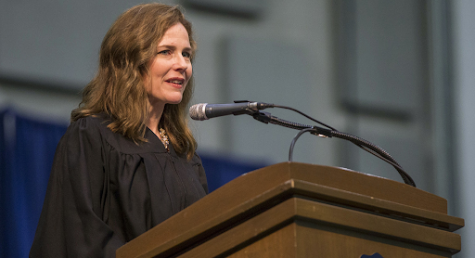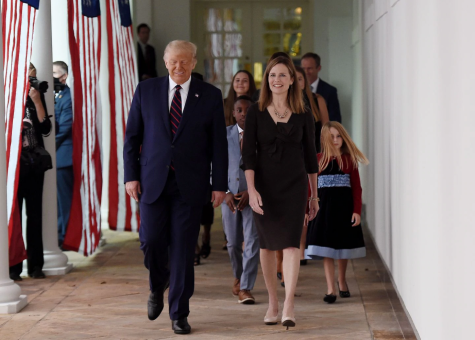
By Clara Helm | Head Editor
October 8, 2020
The 48-year-old US Court of Appeals Judge and Notre Dame law professor, Amy Coney Barrett, is the left’s worst nightmare and the right’s dream come true. The passing of the beloved Supreme Court Justice, Ruth Bader Ginsburg, has left a hole in our judiciary system and added another chaotic party debate onto the mounting pile of 2020 issues. As both sides are vehemently debating the appropriateness of the confirmation of a Justice amidst a presidential election, President Trump has been strong in his stance to nominate Amy Coney Barrett to the Supreme Court and the push of her nomination through the Senate before he leaves office. Barrett’s confirmation has been withheld by religious qualms, the current Covid-19 pandemic, and the usual partisan disputes.
Barrett’s potential confirmation should not be for lack of accomplishment. Judge Barrett earned her B.A. in English Literature from Rhodes College as the top 10% of her class, among other honors, and was chosen by the faculty as the most outstanding graduate in the college’s English department. At Notre Dame, she earned her Juris Doctor, including the Hoyne’s Prize, the law school’s highest honor, as the number one student in her class, and served as executive editor of the Notre Dame Law Review. Barrett researched in the areas of federal courts, constitutional law, and statutory interpretation and has been published in leading journals, including the Columbia, Virginia, and Texas Law Reviews. Finally, she has taught at Notre Dame since 2002 and recently joined the U.S. Court of Appeals in October 2017 where she also had to go through confirmation hearings.

“She does have the technical qualifications to be a Supreme Court justice, since she has gone law school and had a successful legal career,” San Clemente High School senior Skylar Ruffner said. “Yet her strong views may impact people’s perception of her capabilities to make decisions.”
Barrett is a devout Catholic, an aspect that has been called to attention by Democrats since her nomination due to the concern over separation of religion and state. “I do strongly believe Barrett’s personal beliefs will impact future decisions if she is appointed the position,” sophomore Samantha Morgan said. “She is a devout Catholic, leading to her strong opposition of the fight for equality between the sexes, basically what RBG dedicated her entire adult life to…politics and religion should never be intertwined, hence why an extremely strict, problematic Catholic should not be granted the position of Supreme Court Justice.”
But Republicans have retorted that religious fervor should not be held against her as it is constitutionally unjust to do so. The Constitution states in Article VI, Section 3 that lawmakers and federal employees “shall be bound by Oath or Affirmation, to support this Constitution; but no religious test shall ever be required as a Qualification to any Office or public Trust under the United States.” Some still argue that her beliefs will influence how she decides cases before the court. But this could show an absence of awareness of politics and history when arguing that a person’s religious beliefs should not be influential in how they approach judicial questions.
American history is full of examples where religious beliefs influenced how Americans approached political issues. Our government has recognized the importance of religion in people’s lives but also recognized how religious arguments can tear apart a country. Most believed that religion as a moral foundation is essential to the operation of a democracy. As a result, they decided that individuals should be free to choose their religion and declared that the government should not favor one religion over another. Barret’s religion may influence her views of the law, but the same is true of almost every member of the court. What matters is how a nominee views the law, not why she views it that way. What matters are her decisions, not her motivations. As Barrett said herself, “It’s never appropriate for a judge to impose that judge’s personal convictions, whether they derive from faith or anywhere else on the law.”

What could also be possibly inhibiting her path to the Supreme Court is the ever-present Covid-19 pandemic. Republican leaders have had high confidence in her confirmation with the 53-47 republican control of the senate, making it a predictable vote and her confirmation likely. However, recently the president, a large chunk of his staff, and many Senators have been infected by Covid-19 after exposure from a White House event. This could significantly set back Barrett’s approval into the Supreme Court due to the Senators needing to be present for this vote. Two of the Senators that would be crucial for Barret’s approval vote, Thom Tillis of North Carolina (R) and Mike Lee of Utah (R), are infected. Barret’s chances are slightly less probable than they were before, due to Senate not being able to meet as they planned to for their safety, but it may still take a more substantial event to completely derail her confirmation voting.
Mitch McConnell (R) still plans on pushing forward on Barrett’s hearings, even if it means some Senators would have to appear virtually instead of in-person to make sure the confirmation happen earlier. This would prevent Democrats from implementing an after election session if the confirmation clashes with the election. The vote could still be close as it is still up for debate whether it is acceptable for Senators to participate virtually.
Democrats also oppose Barrett’s confirmation due to the ideological views she would replace Ginsburg’s with, the apprehension being that the Affordable Care Act and abortion rights could be rolled back. But Barret does not see these issues as things to change. Like her mentor Justice Antonin Scalia, she applies the philosophy that “Judges must apply the law as written. Judges are not policymakers,” and has even said in her Court of Appeals hearing that she has no interest in challenging the Roe v Wade precedent due to its binding longevity. Her application of the method of constitutional interpretation, which looks at the meaning of words and concepts behind our current and constitutional laws, would restrict her from radically changing these laws. It has been said by many of her colleagues that Barret’s conservatism is fixed in her commitments to the theory of law and methodology, not any commitment to a particular policy outcome. This may not be enough for Democrats due to their tendency towards social change and doubts of Barret’s judicial methods.
Amy Coney Barrett’s confirmation is not a topic to be ignored, and the different parties will persist to either fight for or block her confirmation. Supreme Court Justices stay on the court for their lifetime, having a say in many case interpretations that could outlast many presidents. Barret being the fifth woman to sit on the Supreme Court would make that confirmation even more monumental. Despite what Democrats are saying and what Republicans have said in the past, there are no constitutional barriers against the confirmation of a Justice during an election year. What stands in Barrett’s way is an indeterminate Senate vote, a grueling confirmation hearing, and a perilous race against time.

A highly-debated topic. I encourage anyone interested to listen to the hearings that occured earlier this week – very informative. Thank you for bringing this to light!